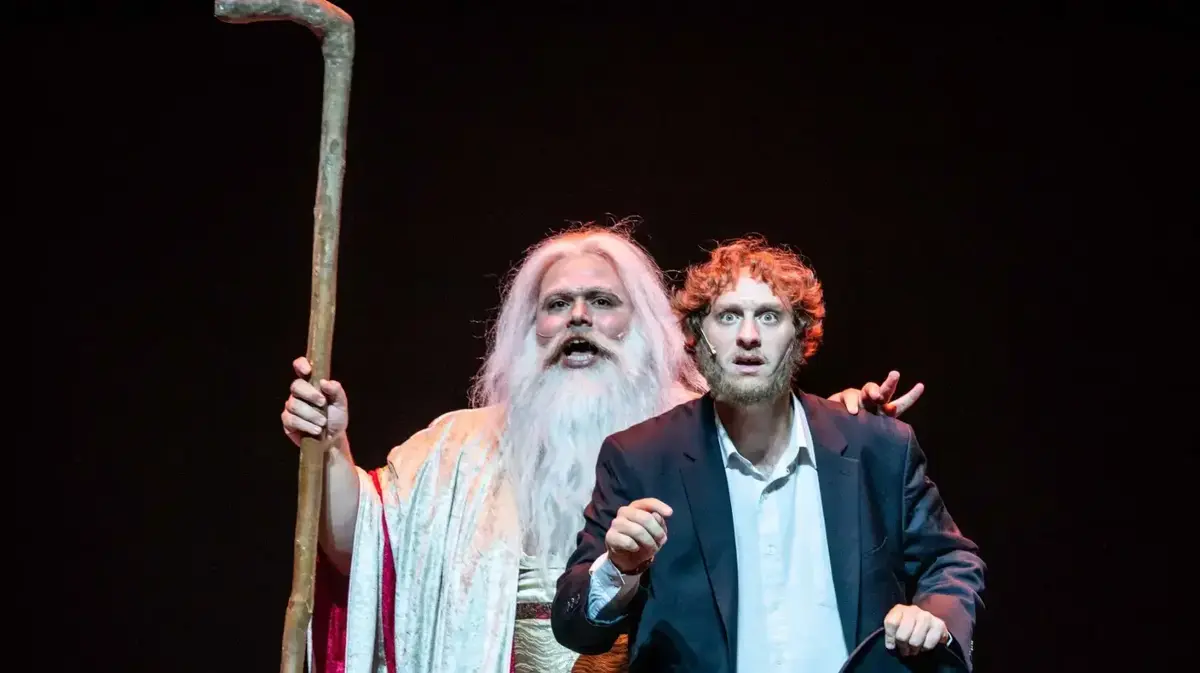An excerpt from the presentation of the musical "Habadnikim" by the Chamber Theater (Walla! Culture system)
In Israel, everything begins and ends with the wedding.
In culture, it is the source of the difficulty and it is the happy ending, the closed circle and the seal of social approval.
This is how it is on TV in programs like "Hatunami", and this is also how it is in the theater this year, with "Going through the wall" - and now also with another musical called "Habadnikim" in the Chamber Theater.
The play in question, penned by Udi Gottschalk and co-directed by him with Gilad Kimchi: on the way to the canopy paves a path full of friction within the segmented Israeli society, between Chabad followers, foreign workers, the LGBT community, criminals, and, well: characters from the Bible c.
The plot describes the plots of Yehuda and Chaim, two inseparable twin brothers, 20 years old and a little from Kfar Chabad - one is a noble, wise man (Ofari Bitterman), and the other is something between a fool and an infantile, but with a good heart (Raphael Abbas). Fortunately, the two find it difficult to find a match. One because no one is good enough for him and as a rule is afraid of commitment, while the other is rejected by each. At the starting point of the play, the studious student almost reluctantly marries the daughter of the community leader, while the other, after receiving another rejection And the last one, a deportee was sent to a Chabad house in Tel Aviv, hoping that maybe in the big city he would find a partner.
The two have never been apart for more than a minute and forty seconds, or something like that, and therefore - his brother decides to join him on the journey to the city of sins, that is: to the neglected south of Tel Aviv.
From the village to the big city.
Atas and Bitterman from "Habadnikim" (Photo: Simcha Barbivo)
While the local Chabad emissary, the cousin of the longtime Chabad matchmaker (Tali Oren in a double appearance that is all professionalism), accepts the complex task, the brothers' hearts open to unexpected people.
Yehuda finds a common language and more so with a dress designer, an extrovert gay and a drag queen in his spare time (Elad Etrakchi), which shakes his mental and spiritual world;
While Haim's soul is tied to the Filipina Mary (Maya Livni), one of the group of foreign workers who is exploited by a criminal with a night club and superstitions named Menashe (Shlomi Koriat in the play I watched, and sometimes Yaniv Suisa).
There are several parallel lines between them: Mary, who does not have visas and her dream is to be "happy" (a wonderful and clever play on words), and not to be deported, and Haim, who feels himself as someone who has been expelled from his home and community, and Haim, who feels himself as someone who has been expelled from his home and community.
Either way, the tension between the inclination of the heart and the communal and religious obligations is increasing: the two love stories, which are impossible from the Orthodox point of view,
So far, at this stage at least, it is a cute but conventional act, which sits on a banal and familiar template: it is the classic story of the young man from the village who arrives in the big city and loses his innocence in the face of the rougher and faster reality, and along the way discovers that life is more than black and white.
The feeling accompanying the plot is that you have already seen it in one version or another, only this time the comedy is a little closer than usual, and its scene is familiar.
In the first act, both Kfar Chabad and Tel Aviv are dichotomous clichés - it's all Torah studies and social and religious ceremonies, and it's Sodom and Gomorrah, a city of sexual permissiveness and crime. If you dig a little below that, you can see in the Tel Aviv of the "Habadniks" something else, close More to the way the first Hebrew city perceives itself: it is a city of refuge for the exiled and marginalized, who build themselves alternative communities and families. Which city will have the upper hand in the end?
Tel Aviv as a city of refuge.
From "Habadnikim" (Photo: Simcha Barbivo)
So far it's nice and lovable, but in the second part the show goes off the rails, in the positive sense of the phrase.
We won't reveal everything, but we will emphasize that following a guest appearance by Moshe Rabbnu (Oral Zabri in a short but great comic role), a surprising and even moving reading of the story of the Exodus from Egypt, and a mass conversion program - the show takes some bold turns that make it more than a lovable comedy, and its mockery of conservative institutions , violent or racist becomes more blatant - not an insignificant thing in the current state of culture.
More in Walla!
You have seen "Walls of Hope" a thousand times on the screen, and you will enjoy it in the theater as well
To the full article
Oral Tzbari steals the show in the role of Moshe Rabbnu.
From "Habadnikim" (Photo: Simcha Barbivo)
A side note: this symbolic celebration is clouded by the thought that the heroes of the show are not in the hall at all, and the public at whose expense the jokes are presented, for better or worse - Chabad followers, foreign workers, marginalized people in South Tel Aviv - are not really visible in the chamber hall. It's hard to escape the thought that this is a parody On one side. To be fair, it dulls the sting of things, as blatant as they may be.
In any case, there is no need to go so far as to claim that this is an anti-religious show. It is clearly not such, and even if it starts from a secular-liberal starting point, it seeks to settle the tensions, and ends with a reconciliation between the worlds. Apart from the criminal Menashe, there are really no bad people here, and the heroes struggle with the social pressures and arrangements that bind them - not with human beings. In this context, Yehuda's struggle with his sexual identity, and his struggle to accept himself and understand that he is not in it, is worthy of mention Nothing bad. The moment when he declares this he rightly drew applause from the audience. This is the moment when the Tel Aviv bubble wins after all.
Everything starts and ends with the wedding.
Tali Oren from "Habadnikim" (Photo: Simcha Barbivo)
All in all, there's a reason it's the talk show of the moment.
Admittedly, "Habadnikim" is far from perfection and accuracy, but it does a lot with a little.
On the one hand, its setting is casual and quite minimal;
The songs are likable but a few choruses could have been happily cut from them;
And a significant part of the jokes are predictable from afar.
Along with all these flaws, she has, pardon the worn expression, the X-factor that makes her a creator from a random creation.
It's a full musical experience, immersive, intense, entertaining and at times also original.
Bitterman, Abbas, Etrakchi and Livni are touching in the main roles, while the older actors, including Daniel Stiopin ("main box office"), prove their professionalism in small but show-stealing roles.
And after all, there is also a happy ending: it ends, as expected, with a good sign and good luck, like the religion of Moses and Israel.
culture
in what
theater
Tags
Udi Gottschalk
Tali Oren
The Chamber Theatre









